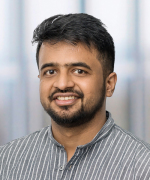Piush Aggarwal
 Foto: Henrik Schipper
Foto: Henrik Schipper
Piush Aggarwal (MSc, B.Tech.)
wissenschaftlicher Mitarbeiter der Forschungsprofessur Computerlinguistik
E-Mail: piush.aggarwal
Universitätsstraße 27 – PRG / Gebäude 5
Raum B 117 (1. Etage)
58097 Hagen
Was ist meine Rolle in CATALPA?
Als Informatiker im Bereich NLP beschäftige ich mich mit der Analyse von Robustheit (Englisch: robustness) in multimodalen Systemen, bei denen Sprache eine der Modalitäten ist.
Warum CATALPA?
In CATALPA kann ich meine Forschung in ein vielfältiges und interdisziplinäres Fachgebiet einbringen. Dies hilft mir, für das Problem, mit dem ich mich befasse, Visionen und eine globale Perspektive zu entwickeln. Multimodale Lösungen für NLP benötigen viel Fachwissen und visionäres Denken, das ich sicher bei CATALPA vorfinden werde.
-
- Seit April 2022: Wissenschaftlicher Mitarbeiter an der Forschungsprofessur Computerlinguistik des Forschungszentrums „Center of Advanced Technology for Assisted Learning an Predictive Analytics“ (CATALPA) der FernUniversität in Hagen
- 01. 2019 - 03. 2022: Wissenschaftlicher Mitarbeiter am Language Technology Lab, Universität Duisburg-Essen
- 04. 2017 - 07.2019: M.Sc. in Informatik mit dem Schwerpunkt Intelligente Netzwerk-Systeme an der Universität Duisburg-Essen
- 11. 2017 - 10.2018: Wissenschaftliche Hilfskraft von Human Language Technology bei eBay Inc.
- 09. 2015 - 03.2017: Ingenieur für Business Intelligence bei der Bank of America
- 10. 2014 - 09.2015: e-Discovery-Ingenieur bei Xerox
- 06. 2012 - 10. 2014: Ingenieur für Business Intelligence bei der Standard Chartered Bank
- 08. 2008 – 03. 2012: B.Tech. in Elektronik und Kommunikation an der Guru Gobind Singh Indraprastha Universität, Delhi, Indien
-
- Multimodale Lösungen für NLP-Anwendungen
- Robustheit von ML-Systemen
- Explainable AI
-
Ich arbeite derzeit in unterschiedlichen Projekten der Forschungsprofessur Computerlinguistik.
-
2024
Konferenzbeiträge
- Aggarwal, P., Mehrabanian, J., Huang, W., Alacam, Ö., & Zesch, T. (2024). Text or Image? What is More Important in Cross-Domain Generalization Capabilities of Hate Meme Detection Models? In Y. Graham & M. Purver (Hrsg.), 18th Conference of the European Chapter of Findings of the Association for Computational Linguistics (S. 104–117). Association for Computational Linguistics. https://openreview.net/forum?id=RZYrUlRGv1
-
Zesch, T., Hanses, M., Seidel, N., Aggarwal, P., Veiel, D., & de Witt, C. (2024). Flexible LLM Experimental Infrastructure (Flexi) – Enabling Experimentation and Innovation in Higher Education Through Access to Open LLMs. In 2024 21st International Conference on Information Technology Based Higher Education and Training (ITHET) (pp. 1–8). IEEE. https://doi.org/10.1109/ITHET61869.2024.10837635
-
Sonstige Publikationen
-
Zesch, T., Hanses, M., Seidel, N., Aggarwal, P., Veiel, D., & Witt, C. de. (2024, June 27). FernUni LLM Experimental Infrastructure (FLEXI) -- Enabling Experimentation and Innovation in Higher Education Through Access to Open Large Language Models. http://arxiv.org/pdf/2407.13013
2023
Konferenzbeiträge
- Aggarwal, P., Chawla, P., Das, M., Saha, P., Mathew, B., Zesch, T., & Mukherjee, A. (2023). HateProof: Are Hateful Meme Detection Systems really Robust? Proceedings of the ACM Web Conference 2023, 3734–3743. https://doi.org/10.1145/3543507.3583356
2022
Konferenzbeiträge
- Aggarwal, P., & Zesch, T. (2022a). Analyzing the Real Vulnerability of Hate Speech Detection Systems against Targeted Intentional Noise. Proceedings of the Eighth Workshop on Noisy User-generated Text (W-NUT 2022), 230–242. https://aclanthology.org/2022.wnut-1.25
- Aggarwal, P., & Zesch, T. (2022b). Bye, Bye, Maintenance Work? Using Model Cloning to Approximate the Behavior of Legacy Tools. Proceedings of the 18th Conference on Natural Language Processing (KONVENS 2022), 175–180. https://aclanthology.org/2022.konvens-1.21
2021
Konferenzbeiträge
- Aggarwal, P., Liman, M. E., Gold, D., & Zesch, T. (2021). VL-BERT+: Detecting Protected Groups in Hateful Multimodal Memes. Proceedings of the 5th Workshop on Online Abuse and Harms (WOAH 2021), 207–214. https://doi.org/10.18653/v1/2021.woah-1.22
- Pham, D. D., Müller, J., Aggarwal, P., Khatri, A., Sharma, M., Zesch, T., & Pauli, J. (2021, Januar). Fully vs. Weakly Supervised Caries Localization in Smartphone Images with CNNs. Artificial Intelligence for Healthcare Applications International Workshop - ICPR 2020 Workshop Proceedings.
2019
Konferenzbeiträge
- Aggarwal, P. (2019). Classification Approaches to Identify Informative Tweets. Proceedings of the Student Research Workshop Associated with RANLP 2019, 7–15. https://acl-bg.org/proceedings/2019/RANLPStud%202019/pdf/RANLPStud002.pdf
- Aggarwal, P., & Aker, A. (2019). Identification of Good and Bad News on Twitter. Proceedings of the International Conference on Recent Advances in Natural Language Processing (RANLP 2019), 9–17. https://www.aclweb.org/anthology/R19-1002.pdf
-


